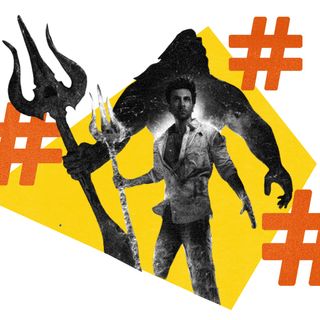
How ‘Energy Vampires’ at Work Can Leave People Drained
This particular species of colleagues trap or corner people into conversations, so much that it indirectly disrupts the flow of work.

Colin Robinson is 100-years-old, is remarkably ordinary, except for how his irises glow when he feeds on other people’s energy. The character featured in What We Do in the Shadows first appearedin 2018, essaying an “energy vampire” whose hunting ground is the office. He preys on his co-workers by simply being terribly boring, banal, and frustrating; his lift force is built on feeding off people’s energy.
The species of energy vampires is barely limited to the fictional world. More often than not, this particular species of work colleagues hovers around, lingering in the shadows of cubicles and conference rooms, waiting to pounce on people with a draining conversation. Think of the time when a colleague spends 20 minutes chatting with you, leaves, and one suddenly feels too emotionally exhausted or distracted to actually work. Unlike traditional vampires, they suck energy instead of blood; unlike the neck, they spy on anyone lending them their ears and open air.
Time, emotions, and energy are a limited currency in the workplace. The pandemic further depleted their levels by radically altering what we do and how we function — so, preserving emotional well-being at work is a task ever so pertinent. The knowledge of who classifies as an emotional vampire, and how to maneuver these conversations, is imperative to possess in the modern office.
At the very outset, though, one may wonder if energy vampires are just an overtly cynical perception of workplace friendships. Surely, watercooler conversations or personal chats are cordial and kind? Yet, psychic vampirism lies in shades of gray: one marked by overtalking, incessant interruptions, manipulation, and even being egotistical. The intention is critical here; when someone quite knowingly pushes one to regress into a sour mood, it most definitely is not done in good faith. Perhaps, the first name that comes to mind while thinking of this category of colleagues is a start to identifying the energy vampire.
Moreover, according to Tessa West, associate professor of psychology at New York University and author of Jerks at Work: Toxic Coworkers and What to Do About Them, the body betrays signs of unease too. “If you can actually feel your heart rate and your palms are physically sweating, that means you’re in a really rough spot because most of the time stress responses aren’t perceptible,” West explained. There is uncertainty from the very get-go; the prospect of someone approaching the desk invites reluctance more than warmth.
Other clues could be the feeling of being trapped or cornered in the conversation, so much that it indirectly disrupts the flow of work. A nagging feeling instantly arises, when one feels like they have been occupied the whole day but hardly any work was done.
Related on The Swaddle:
Quick Chats, Interruptions at Work Help Create a Sense of Belonging: Study
There is no clinical term to categorize someone as an energy vampire, though. Some experts have however identified common personality traits among those who exhibit these patterns: people who may be too dramatic, behave or think erratically, or be overly emotional at the workplace, according to Christiane Northrup, M.D., and author of the book Dodging Energy Vampires.
There are hints of narcissism and pessimism in the way they operate. A type of energy vampire is the “egomaniac,” people who feel “entitled to take up your time (obviously) because their agenda supersedes above all,” as Melody Walding noted in Forbes. Imagine an interaction where someone constantly downplays your/other’s work, rails on and on about personal achievements, and/or makes one feel sensitive or guilty for resisting such an interaction. Someone hogging over the meeting time with irrelevant anecdotes (more than once), or just casting a grim cloud over any and every conversation, is bound to impact energy levels in a close working space.
In that sense, energy vampires can be both peers and managers; the latter wielding their powers by allocating “work to other people without offering to do anything and invents problems that don’t exist may be an energy vampire,” West said.
There may even be some characteristics that make one more likely to fall “prey” to these conversations. Perhaps, someone who is an empath, compassionate, and introverted, is one who won’t strictly resist conversations. Energy vampires are likely to avoid people with a vivacious social circle; for these extra colleagues may serve as “bodyguards” to one’s emotional time.
Walding likened the prey of energy vampires to a “slot machine” of sorts. The sole function of the machine is to reward people some times. “An energy vampire is used to being rewarded when people engage with them,” Walding wrote, meaning that people’s attempts to avoid these conversations may not work. “Despite your efforts, they’re hoping that the next reward is just around the corner again.”
Arguably, these are not innocuous happenstances at the workplace. Energy vampires can quite unknowingly (and knowingly) be the source of chronic stress; constantly feeling trapped and exhausted around someone can easily make one feel stressed and guilty. “They’re a health risk,” explained Northrup, referring to the link between chronic stress and other physical manifestations like autoimmune diseases, heart disease, obesity, and depression.
This is a game of cat-and-mouse, of someone chasing your time and energy. Perhaps, the only way to escape is to acknowledge that a said interaction is depleting your emotional bandwidth. The magic word is boundaries; themagician, you. It’s instructive to know the difference between someone “venting” and one “dumping” things on the other. Northrup puts it best with: “You can be a loving, compassionate person and still stick up for yourself. You don’t need to be a doormat.”
The thing about psychic vampirism is: that one may even do it unconsciously. An energy vampire could be anyone, even you. This is where self-awareness helps; if you’re an energy vampire, at least now you know enough to break this saga of draining conversations.
Saumya Kalia is an Associate Editor at The Swaddle. Her journalism and writing explore issues of social justice, digital sub-cultures, media ecosystem, literature, and memory as they cut across socio-cultural periods. You can reach her at @Saumya_Kalia.
Related


How Bollywood Is Losing Its Credibility
